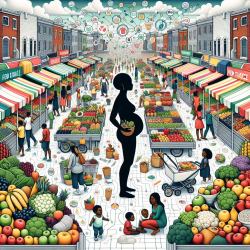The journey of motherhood is a transformative experience that brings with it a myriad of challenges and opportunities. For young, urban Black pregnant women, these challenges are often compounded by structural inequities such as food apartheid and economic hardships. A recent study titled Food Choice and Dietary Perspectives of Young, Urban, Black Pregnant Women: A Focus Group Study sheds light on the complex factors influencing food choices and dietary perspectives in this demographic. As practitioners, understanding these factors can enhance our ability to support maternal health effectively.
Understanding the Determinants of Food Choice
The study identifies three major themes affecting food choices among young Black pregnant women: food access, stress and family influences on eating, and the need for nutritional education during pregnancy. These themes are deeply rooted in the social ecological model (SEM), which considers multiple levels of influence from individual beliefs to societal norms.
- Food Access: The participants highlighted significant barriers to accessing healthy foods due to food apartheid—areas with limited availability of affordable and nutritious options. This lack of access forces many to rely on fast-food alternatives that are more readily available but less healthy.
- Stress and Family Influences: Emotional stress and family dynamics play a critical role in shaping dietary habits. Participants reported that stress often led to unhealthy eating patterns, while family pressures could either encourage or hinder healthy eating.
- Nutritional Education: There is a clear need for targeted nutritional education that acknowledges cultural preferences and provides practical guidance on maintaining a healthy diet during pregnancy.
Implementing Research Outcomes in Practice
Practitioners can leverage the insights from this study to improve their approach to maternal healthcare for Black women. Here are some actionable steps:
- Culturally Tailored Nutritional Counseling: Develop educational programs that respect cultural food preferences while promoting healthier choices. Engage community leaders and use culturally relevant materials to enhance engagement.
- Addressing Food Apartheid: Advocate for policy changes that increase access to healthy foods in underserved areas. Collaborate with local organizations to support community gardens or farmers' markets.
- Stress Management Support: Incorporate stress-reduction techniques into prenatal care programs. Encourage support groups where pregnant women can share experiences and coping strategies.
The Path Forward
The findings from this study underscore the importance of addressing systemic barriers that affect food choices among young Black pregnant women. By understanding these challenges, practitioners can develop more effective interventions that promote better maternal health outcomes. Continued research is essential to deepen our understanding of these issues and drive meaningful change.
To read the original research paper, please follow this link: Food Choice and Dietary Perspectives of Young, Urban, Black Pregnant Women: A Focus Group Study.










